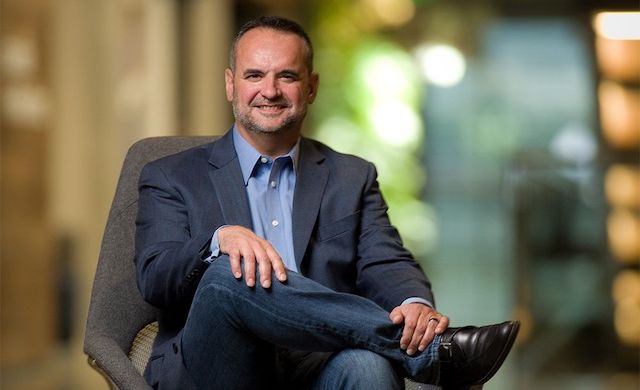
From Risk to Reward: Your Interests Might Take You in Surprising Directions
08/30/2022 06:00AM | 1464 viewsEvery day each of us manages risk, whether we know it or not.
We hide our valuables and lock our car. We choose between spending time fixing our leaky faucet ourselves or spending money on an expert. We reposition the furniture so we stop bumping into the chair at night in the dark.
Michael Silveira does the same thing for big companies, on a much (much!) larger scale:
- keeping national retail chains’ product inventories safe from theft or damage,
- looking for ways for large organizations to make the most of their resources, and
- making sure employees stay safe while they work (which may or may not involve moving the furniture).
Today, Silveira is the division vice president of west operations at Banfield Pet Hospital, the leading provider of preventive veterinary care in the United States, with 1,000+ hospitals and 19,000+ associates in neighborhoods across the country. In his role, Silveira oversees the operations of Banfield across the western half of the United States, encompassing roughly 500 hospitals and nearly 8,500 associates.
Not What He Thought He’d Be Doing
In college, Silveira studied and trained in the elements of risk, earning a degree in business administration with a concentration in law.
“I was interested in law enforcement and went through the police academy,” he said. “But that didn’t seem like quite the right fit for me.”
But those early interests did spark new and unexpected opportunities.
Silveira started his career at a large retail chain managing loss prevention and safety awareness programs for two stores in Massachusetts. He grew within the company, with ever-expanding roles and responsibilities, eventually becoming senior regional loss prevention manager for the New England division.
He developed a specialty in both loss prevention and risk management – two disciplines that often go hand in hand. They involve protecting a company’s inventory: making sure items are not damaged or stolen from a store or at any point while they travel from the manufacturer to the warehouse to a store.
But their combined purpose is bigger and broader than protecting valuables. It can also involve preventing losses of efficiency or productivity – finding gaps in how a company functions and looking for opportunities to make a business stronger. And perhaps most important: it’s also about keeping people safe while they work.
After a decade he joined a national pharmacy retailer as loss prevention director for the New England and New York regions. He eventually worked his way up to vice president of loss prevention and drug diversion.
After 16 years in the pharmacy space, he was eager for a new challenge. He found one with Banfield.
“I have dogs and I happen to be pet lover, so Banfield is a great fit,” he said. “Also, there’s a lot of overlap in the skills and expertise needed from my previous roles regarding operations and medicine.”
It helps that he knows how to maintain a balance of leading people who are experts in running a business and leading people who are experts in medicine and health.
Improving Wellbeing for People and for the Business
Silveira’s first charge at Banfield was to help launch the company’s wellbeing strategy for helping associates thrive, identifying five key areas in which they would focus: healthy body, healthy mind, healthy finances, healthy career and healthy communities.
“Our team did an unbelievable job envisioning how we might help associates,” he said. “Health goes beyond just your physical wellbeing. That’s important. But we also went into mental health, financial health, community health. We expanded what health and wellbeing means in today’s modern world.”
He also established a new team to redefine how they support Banfield hospitals – to identify the most efficient way to run a hospital profitably.
“I lead people, I help people grow, I help people deliver high-quality pet care. I find my role to be one that enables people to do the things they do best. I step in and provide guidance and support, and create new opportunities and experiences for them.”
Today he oversees all Banfield operations (about 500 hospitals) across the western half of the United States. He leads five regional vice presidents who run the day to day operations for hospitals in the area.
“The best compliment I’ve ever received is when someone tells me I’ve inspired them to think differently or that I’ve given them a different perspective. That’s really motivating. I enjoy recognizing when someone has something on their mind and they’re not articulating it, and I can do some work to understand. That just makes my week.”
His Advice: Embrace Your Culture
Silveira was born in the United States after his parents came here from Portugal when they were in their late teens. His first language was Portuguese, and he and his mother would try to learn English by reading the newspaper.
“When I was young, my mom and dad put a lot of emphasis on assimilation. And that’s important, sure. But never lose sight of where you’re from and what your culture is. Keep it close to you. It shapes who you are. Why suppress that? I’ve never let the language go. When I talk to my mother, we often speak in Portuguese so I can keep it up.”
He also has this advice for people as they navigate life and work:
- Never stop learning. “I make it a point to learn something new every day. If the day’s almost over and I haven’t learned anything, I walk over to another department and starting asking questions. That’s how I get my ‘learning steps’ in.”
- Constantly be curious. “No matter your background and experience, never think you know it all. Be curious and ask a lot of questions. I am ferocious about developing my team and myself. You never know it all.”
- Decide what NOT to do. An early mentor gave him this advice. He said he remembers being extremely busy and involved in a lot of complex work. His mentor told him it’s just important what you decide NOT to do, as it is what you decide to do.
“Today, 20 years after that conversation, I live that principle every day. Whether I’m deciding projects, or deciding not to read mail for which I’m simply copied (not the intended recipient). It’s shaped the way I think.”
If you think about it, being deliberate about what you will give your time or attention to on any given day is yet another way of managing risk and preventing loss.
The reward? Maintaining focus on what really matters.






Post your Comment
Please login or sign up to comment
Comments